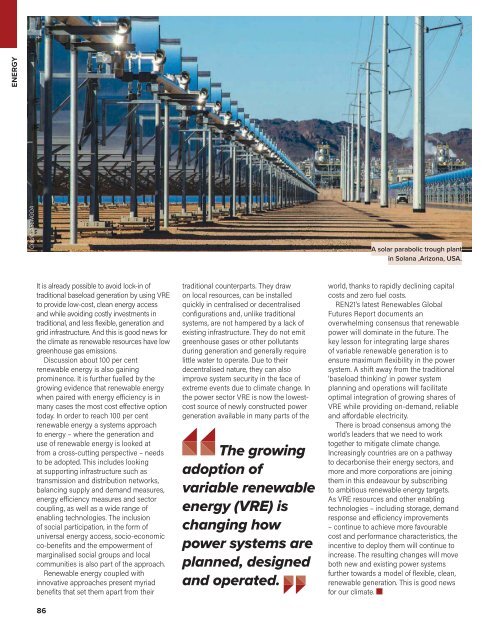Climate Action 2017-2018
Create successful ePaper yourself
Turn your PDF publications into a flip-book with our unique Google optimized e-Paper software.
ENERGY<br />
Credit: ABENGOA<br />
A solar parabolic trough plant<br />
in Solana ,Arizona, USA.<br />
It is already possible to avoid lock-in of<br />
traditional baseload generation by using VRE<br />
to provide low-cost, clean energy access<br />
and while avoiding costly investments in<br />
traditional, and less flexible, generation and<br />
grid infrastructure. And this is good news for<br />
the climate as renewable resources have low<br />
greenhouse gas emissions.<br />
Discussion about 100 per cent<br />
renewable energy is also gaining<br />
prominence. It is further fuelled by the<br />
growing evidence that renewable energy<br />
when paired with energy efficiency is in<br />
many cases the most cost effective option<br />
today. In order to reach 100 per cent<br />
renewable energy a systems approach<br />
to energy – where the generation and<br />
use of renewable energy is looked at<br />
from a cross-cutting perspective – needs<br />
to be adopted. This includes looking<br />
at supporting infrastructure such as<br />
transmission and distribution networks,<br />
balancing supply and demand measures,<br />
energy efficiency measures and sector<br />
coupling, as well as a wide range of<br />
enabling technologies. The inclusion<br />
of social participation, in the form of<br />
universal energy access, socio-economic<br />
co-benefits and the empowerment of<br />
marginalised social groups and local<br />
communities is also part of the approach.<br />
Renewable energy coupled with<br />
innovative approaches present myriad<br />
benefits that set them apart from their<br />
86<br />
traditional counterparts. They draw<br />
on local resources, can be installed<br />
quickly in centralised or decentralised<br />
configurations and, unlike traditional<br />
systems, are not hampered by a lack of<br />
existing infrastructure. They do not emit<br />
greenhouse gases or other pollutants<br />
during generation and generally require<br />
little water to operate. Due to their<br />
decentralised nature, they can also<br />
improve system security in the face of<br />
extreme events due to climate change. In<br />
the power sector VRE is now the lowestcost<br />
source of newly constructed power<br />
generation available in many parts of the<br />
The growing<br />
adoption of<br />
variable renewable<br />
energy (VRE) is<br />
changing how<br />
power systems are<br />
planned, designed<br />
and operated.<br />
world, thanks to rapidly declining capital<br />
costs and zero fuel costs.<br />
REN21’s latest Renewables Global<br />
Futures Report documents an<br />
overwhelming consensus that renewable<br />
power will dominate in the future. The<br />
key lesson for integrating large shares<br />
of variable renewable generation is to<br />
ensure maximum flexibility in the power<br />
system. A shift away from the traditional<br />
‘baseload thinking’ in power system<br />
planning and operations will facilitate<br />
optimal integration of growing shares of<br />
VRE while providing on-demand, reliable<br />
and affordable electricity.<br />
There is broad consensus among the<br />
world’s leaders that we need to work<br />
together to mitigate climate change.<br />
Increasingly countries are on a pathway<br />
to decarbonise their energy sectors, and<br />
more and more corporations are joining<br />
them in this endeavour by subscribing<br />
to ambitious renewable energy targets.<br />
As VRE resources and other enabling<br />
technologies – including storage, demand<br />
response and efficiency improvements<br />
– continue to achieve more favourable<br />
cost and performance characteristics, the<br />
incentive to deploy them will continue to<br />
increase. The resulting changes will move<br />
both new and existing power systems<br />
further towards a model of flexible, clean,<br />
renewable generation. This is good news<br />
for our climate.












